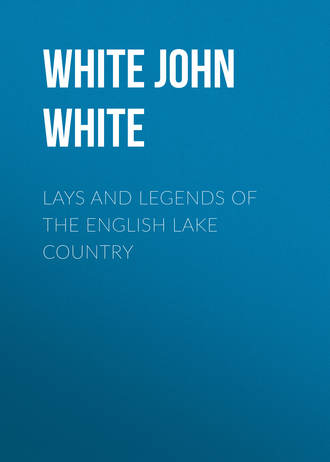
White John White
Lays and Legends of the English Lake Country
Things had not got quite straight in this respect within the sanctuary at a much later period. The Rev. Thos. Warcup, incumbent of the parish church of Wigton, in the civil war was obliged to fly on account of his loyalty to the sovereign. After the restoration of Charles II. he returned to his cure; and tradition says, that the butcher-market was then held upon the Sunday, and the butchers hung up their carcasses even at the church door, to attract the notice of their customers as they went in and came out of church; and it was not an unfrequent thing to see people, who had made their bargains before prayer began, hang their joints of meat over the backs of the seats until the pious clergyman had finished the service. The zealous priest, after having long, but ineffectually, endeavoured to make his congregation sensible of the indecency of such practices, undertook a journey to London, on foot, for the purpose of petitioning the king to have the market-day established on the Tuesday; which favour it is said he had interest enough to obtain.
This faithful priest long before his death caused his own monument to be erected in the churchyard, with this inscription in verse of his own composing:
Thomas Warcup prepar'd this stone,
To mind him of his best home.
Little but sin and misery here,
Till we be carried on our bier.
Out of the grave and earth's dust,
The Lord will raise me up, I trust;
To live with Christe eternallie,
Who, me to save, himself did die.
Mihi est Christus et in vita et in morte lucrum. Phil. i. 21.Obiit anno 1653.
Thus it appears his decease did not take place until some years after the date at which he records his death; probably a period marked by some important change in his life, or of unusual solemnity reminds us that only thirty-five years ago, at a very few miles from its base, one who served the pastoral office more than fifty years, eking out a wretched maintenance upon a small farm; while his sons were at the plough, was of necessity compelled to send his daughters with horses and carts for coals and lime, and to lead manure to the fields and distribute it over the land; whilst the Dean and Chapter of his diocese were the patrons of his cure.
Such things can hardly be witnessed at this day. But a minister may be seen even now (1867) on the other side of the district, leading the choir in the aisle, in his surplice, with bow and fiddle in his hands, and then resuming his place at the desk, with becoming solemnity, until the course of the service requires his instrument again. His sense of harmony is acute; for in the middle of the psalm, his arms will fly apart, and the volume of sound be stopped, until an offensive note has been ejected, and the strain rectified, and renewed.
A curious discovery has recently been made in the venerable parish church of Windermere. The plaster having come away over one of the arches, a band of red and black was revealed. On the removal of more of the thick layers of whitewash, a beautiful inscription in old English characters was found. Further search was instituted, and similar inscriptions have been discovered on all the walls between the arches in the nave. It is conjectured that these inscriptions were placed in the church at the time of the Reformation, as they are mostly directed against the dogma of transubstantiation, whilst they give plain instructions in the doctrine of the Sacraments.
On the north side of the nave the following have been deciphered:—
"Howe many sacramentes are their?—Two: baptisme and the supper of the Lord.
"In baptisme which ys ye signe yt may be seene?—Water onelie.
"Which is ye grace yt cannot be seene?—The washinge awaie of synnes by the bloode of Christe.
"In the Lordes supper which is ye signe yt may be sene?—Breade and Wyne.
"Which is ye grace yt cannot be seene?—The bodie and bloode of Christe."
On the south wall the inscriptions are as follow:—
"In goinge to ye table of the Lord, what ought a man to consider or doe pryncipalie?—T examine him selfe.
"Is the breade and wine turned into ye bodie and bloode of Christe?—No, for if you turne or take away ye signe that may be sene it is no sacrament.
"For the strengthenynge of your faith, howe many things learne yow in ye Lordes Supper?—Two: as by ye hand and mouthe, my bodie receiuth breade and wine: so by faithe, my soule dothe feade of ye bodie and blood of Christ: secondlie all ye benefittes of Christ his passion and his righteousness, are as surelye sealled up to be mine as my selfe had wrought them.
"To the strengthening of your faithe how many thinges learne you in baptisme?—Two: first, as water washeth away the filthines of ye fleshe: so ye bloode of Christ washeth awaie synne from my soull; secondly, I am taught to rise againe to neunes of life."


